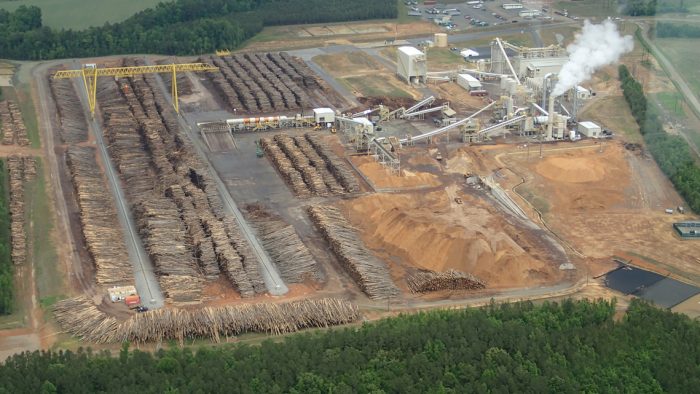Active Energy sued for illegal pollution of NC’s Lumber River from toxic site
Two local subsidiaries of the British-owned Active Energy Group are known in Robeson County, North Carolina, for their history of unpermitted discharges of industrial pollution into the Lumber River from their property heavily contaminated with toxic solvents.
That’s a clear violation of the Clean Water Act, so today, we sued to stop them.

Biomass for British power is stripping southern forests
The lawsuit, filed on behalf of Winyah Rivers Alliance in the U.S. District Court for the Eastern District of North Carolina, outlines SELC’s concerns regarding the unlawful discharges of pollutants including suspended solids, nitrogen, zinc, copper, and chromium by subsidiaries Active Energy Renewable Power and Lumberton Energy Holdings into the river and its tributary, Jacob’s Branch.
“Active Energy Renewable power can’t pollute the Lumber River without a state permit to limit pollutants,” says Heather Hillaker, a staff attorney at SELC. “Given the harmful toxins present on Active Energy’s property, pollution limits and frequent monitoring are crucial to protect the health of the Lumber River, people, and wildlife.”
The area of the Lumber River immediately downstream of Active Energy’s unpermitted discharges is a state and federally designated scenic river due to its unique natural, recreational, fish and wildlife, and cultural values. Some pollutants it’s discharging can harm fish and other aquatic life in the river.
By refusing to even submit a wastewater permit application, this company is showing the community and our members how little it cares about the health and safety of the anglers, swimmers, boaters – everyone who lives in Lumberton and Robeson County.
Jefferson Currie II, Winyah Rivers Alliance’s Lumber Riverkeeper
In the absence of the required permit, the company can store wastewater on site, sell it, or store it off-site, but it cannot pollute the Lumber River without a lawful permit to monitor for and limit the toxic pollutants present on its contaminated Brownfield property.
By not applying for a state permit, Active Energy has evaded disclosing information to interested communities about its treatment of contaminated wastewater at the site, current pollution limits, and more rigorous monitoring for known toxins present on its site. It also denies communities nearby and that rely on the river the opportunity to participate in the permitting process and provide comment to the state as part of that process.
Residents of nearby communities that are predominantly Native American and Black already are exposed to multiple sources of industrial pollution.
“By refusing to even submit a wastewater permit application, this company is showing the community and our members how little it cares about the health and safety of the anglers, swimmers, boaters – everyone who lives in Lumberton and Robeson County,” says Jefferson Currie II, the Winyah Rivers Alliance’s Lumber Riverkeeper.
Although Active Energy does not have the required Clean Water Act permit for its ongoing industrial wastewater discharges and is operating in violation of the law, it still plans to start manufacturing wood pellets at the contaminated site in early 2021. The new pellet mill would turn virgin wood into a coal-like substance called “black pellets,” or CoalSwitch, for export to markets in Europe and Asia.
And while the company has repeatedly told investors it plans to rapidly scale up production to approximately 440,000 tons of black pellets per year once the Lumberton pellet mill is operational, its air permit currently only allows emissions from a 43,800 ton per year operation. Active Energy has not disclosed to either regulators or nearby communities what pollution will be emitted into the air or water from its expanded facility.
SELC will be monitoring the situation closely.
